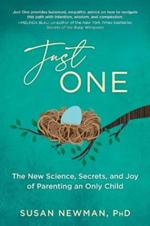With more women wanting or having to work and the cost of raising children rising, the number of one-child families has increased markedly and is quietly becoming the “new normal.” But, that fact alone doesn’t clarify what is desired or plausible given an individual’s situation. What psychologist Susan Newman has learned during her most recent study (the fourth on the subject of roughly 100 subjects each) from only children and their parents will help readers wrestle with concerns, whether they are deciding their family size or parenting one child right now. The answers are quite different from what they were some 30 years ago when Newman had her only child, and responses have changed mightily over the last decade as well. The perspective of other parents and adult only children will comfort readers who are still “on the fence” about keeping their child an only child and those who face infertility. And, the book will guide parents raising an only child by providing specific and reassuring advice brought to life by personal stories and the latest academic research. Most significantly, the new insights demonstrate not only how attitudes about family size have shifted, but also why the stereotypes that stubbornly clung to only children have all but disappeared at the same time societal pressure put on people of childbearing age to multiply has eased. The open enthusiasm about having or being an only child is apparent in supporting personal comments. Collectively, the stories and data reveal a stark rethinking of what it means to be a family and provide a greater understanding of why more parents are embracing the idea of “just one.”

Just one
ISBN: 9781493088584
Format: Paperback
Publisher: Globe Pequot
Origin: US
Release Date: August, 2025

